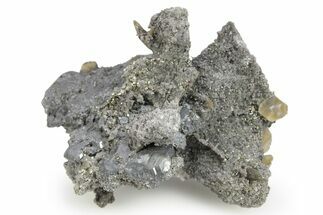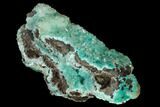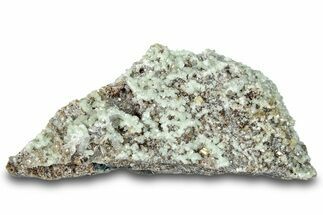This Specimen has been sold.
2" Smithsonite, Aurichalcite and Hemimorphite Association - Utah
This colorful specimen contains an association of colorless hemimorphite crystals, light-green botryoidal smithsonite and blue-green aurichalcite. It was collected from the Hidden Treasure Mine in the Ophir District of Utah, a location that's well known for its zinc and copper mineral deposits.
About Smithsonite
Smithsonite forms in earthy botryoidal masses, sometimes forming grape-like structures. It can be found as a secondary mineral in oxidation zones of zinc ore deposits, in some sedimentary deposits, and as an oxidation product of sphalerite. The general chemical formula of smithsonite is ZnCO3, however Fe (iron), Mg (magnesium), Ca (calcium), Cd (cadmium), Cu (copper), and Co (cobalt) can take the place of Zn (zinc). This potential for elemental variation results in smithsonite's wide variety of colors, including blue, green, yellow, orange, pink, purple, brown, gray, white, and colorless.
Smithsonite forms in earthy botryoidal masses, sometimes forming grape-like structures. It can be found as a secondary mineral in oxidation zones of zinc ore deposits, in some sedimentary deposits, and as an oxidation product of sphalerite. The general chemical formula of smithsonite is ZnCO3, however Fe (iron), Mg (magnesium), Ca (calcium), Cd (cadmium), Cu (copper), and Co (cobalt) can take the place of Zn (zinc). This potential for elemental variation results in smithsonite's wide variety of colors, including blue, green, yellow, orange, pink, purple, brown, gray, white, and colorless.
Aurichalcite (chemical formula (Zn,Cu)5(CO3)2(OH)6) is a secondary mineral that forms in the oxidation zones of copper and zinc ore deposits. It often forms as radiating, fuzzy-looking acicular blue-green crystals and linings along cavity walls.
About Hemimorphite
Hemimorphite is a basic hydrous zinc silicate with the chemical composition Zn4Si2O7(OH)2 · H2O. It earned its name from the Greek terms that best define its crystal structure. It has two different terminations on each side of the crystal, hence the inclusion of the greek terms "hemi", meaning half, and "morph", meaning shape. The crystal formations can range anywhere between a crystal druze or botryoidal formation to radiating acicular crystals and more. Hemimorphite has been found in shades of white, beige, light brown, and a bright, electric blue. It can also form as yellow and green crystals on rare occasions.
Prior to 1803, hemimorphite and smithsonite were thought to be the same mineral, called "calamine". However, further scientific research concluded that these were two distinct minerals.
Hemimorphite is a basic hydrous zinc silicate with the chemical composition Zn4Si2O7(OH)2 · H2O. It earned its name from the Greek terms that best define its crystal structure. It has two different terminations on each side of the crystal, hence the inclusion of the greek terms "hemi", meaning half, and "morph", meaning shape. The crystal formations can range anywhere between a crystal druze or botryoidal formation to radiating acicular crystals and more. Hemimorphite has been found in shades of white, beige, light brown, and a bright, electric blue. It can also form as yellow and green crystals on rare occasions.
Prior to 1803, hemimorphite and smithsonite were thought to be the same mineral, called "calamine". However, further scientific research concluded that these were two distinct minerals.
SPECIES
Smithsonite, Aurichalcite & Hemimorphite
LOCATION
Hidden Treasure Mine, Ophir District, Utah
SIZE
2 x 1"
CATEGORY
ITEM
#119531
 Reviews
Reviews













